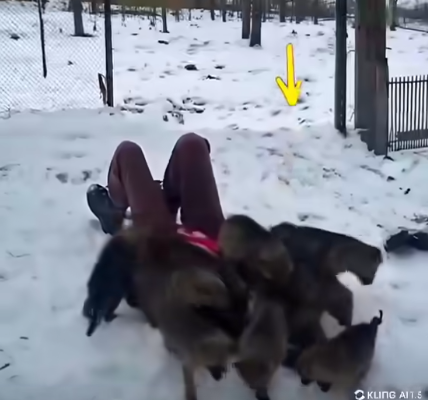Imagine this: You are alone in the forest. The only sound is the crunch of leaves beneath your boots. Suddenly, you feel it—eyes watching you. Shadows flicker between the trees. Silent, swift movement. This is not your imagination. These are wolves.
While wolf attacks on humans are extremely rare, they are not impossible. And in the wilderness, preparation can be the difference between life and death. This article is not meant to scare you, nor is it a romantic tale of man versus beast. It is a practical survival guide. What should you do if wolves really attack? How do you prevent such a situation? And if it happens—how do you make it out alive?

Wolves: Intelligent Hunters, Not Mindless Beasts
Wolves are not reckless killers. They are intelligent, strategic pack animals with a highly developed sense of communication and social structure. They typically avoid humans, but under certain circumstances—such as hunger, protection of territory or young, disease, or provocation—they may become a real threat.
Who Is Most at Risk?
Solo hikers or backpackers
Campers in remote wilderness
Hunters or forestry workers
Anyone near a wolf den or kill site
People carrying food or game meat with strong odors
Signs That Wolves Are Nearby
Scent – Wolves can emit a musky, wild odor when nearby.
Tracks – Paw prints in a single-file line, often in snow or soft ground.
Howling – Especially alarming if it grows louder or comes from multiple directions.
Animal behavior – Dogs may become nervous or refuse to move forward.
What to Do If You See Wolves
If you spot wolves but they haven’t attacked:
Stay calm. Panic makes you vulnerable. Wolves sense fear and weakness.
Do not turn your back. Slowly move away while keeping your eyes on them.
Make yourself look bigger. Raise your arms, open your jacket, hold up your backpack.
Make loud noises. Shout, bang metal objects, use an emergency whistle or siren.
Do not run. Running triggers a chase instinct. Wolves are faster and more enduring.
Avoid prolonged eye contact. It may be seen as a challenge.
When the Attack Begins
Wolves often circle and assess before attacking. If they decide to strike:
Use any object as a weapon. A stick, rock, knife, or even a pen can be useful.
Aim for sensitive areas. Eyes, nose, and snout are the most vulnerable.
Stay on your feet. If knocked down, protect your neck and stomach. Roll, kick, scream.
Use fire. A burning stick or lighter may deter them.
Climb a tree if possible. Wolves cannot follow you up.
Never give up. Your determination can affect the outcome.
After the Attack
If you survive an encounter:
Check for injuries. Wolf bites can cause severe bleeding and infection.
Get to safety. Avoid staying exposed in case they return.
Seek medical help immediately. Rabies and bacterial infections are serious threats.
Report the incident to local authorities or park rangers.
How to Avoid Wolf Encounters
The best survival tactic is prevention:
Don’t hike alone, especially in wolf territory.
Keep food sealed and away from your sleeping area when camping.
Make noise as you walk to alert wildlife and avoid surprising them.
Avoid wolf dens and pups—they are highly protective of their young.
Research your route in advance, especially if recent wolf sightings have been reported.
Carry deterrents such as pepper spray for animals, flares, or noise devices.
Mental Readiness Is Key
In survival situations, the most critical asset is not muscle—it’s mindset. Staying calm, thinking clearly, and acting decisively can make all the difference. Preparation begins long before an encounter, through knowledge, training, and awareness. Your goal is not to fight a wolf. Your goal is to survive.
Conclusion
An encounter with wolves is a scenario few ever face, and even fewer prepare for. But being ready does not mean being afraid. It means respecting nature’s power and understanding how to coexist with it. Wolves are not your enemy—but they are wild, and wild things follow their own rules.
In the wilderness, every step you take should be informed, deliberate, and humble. If you walk prepared, you walk stronger. And if the worst happens, you stand a far greater chance of walking out alive.



